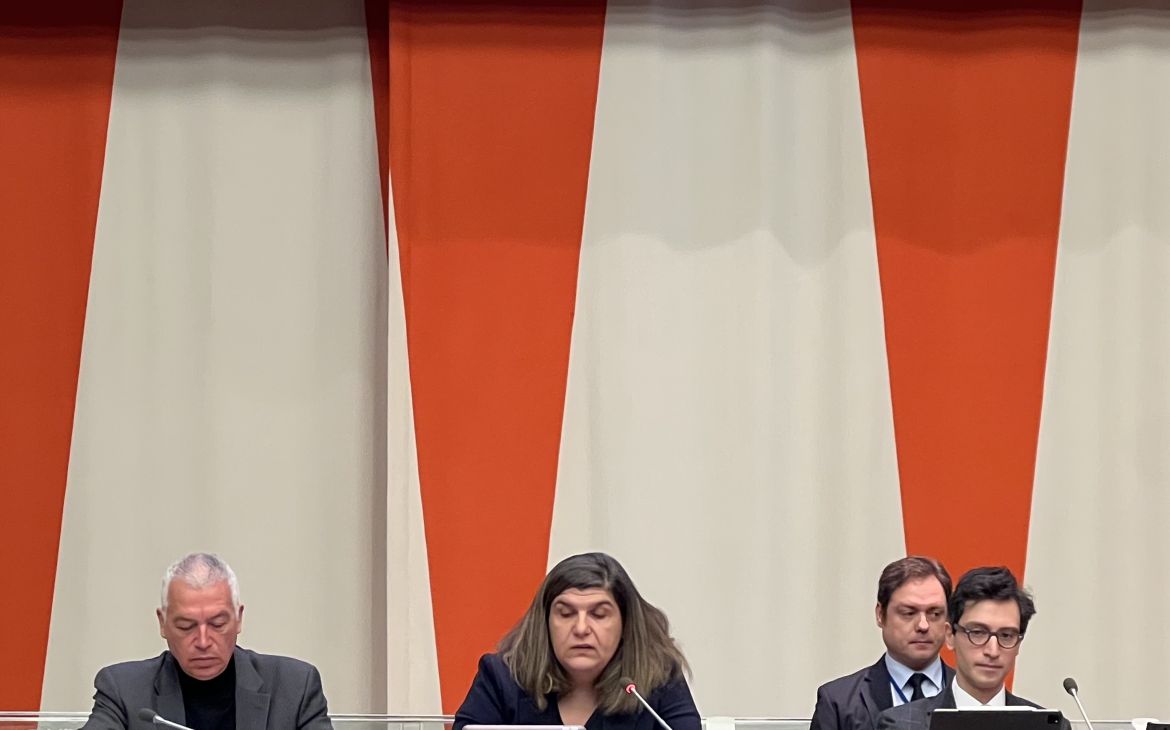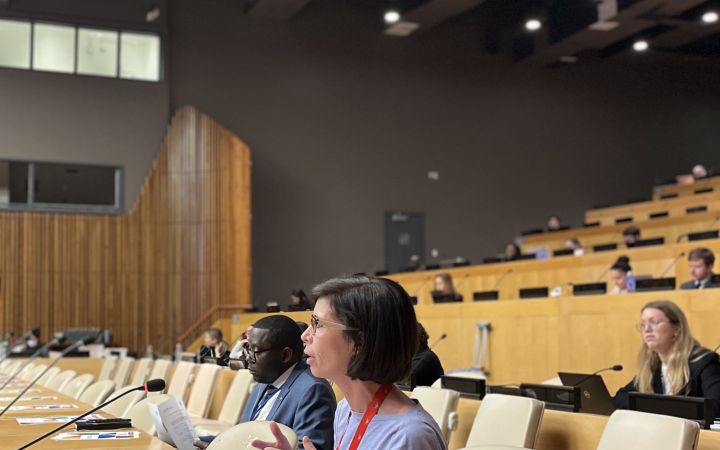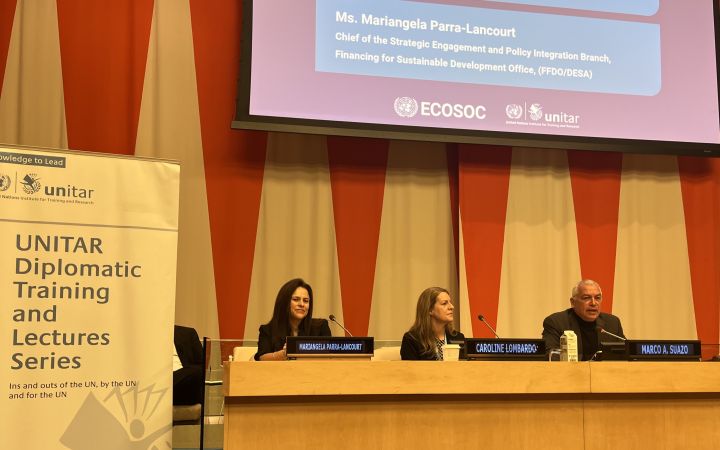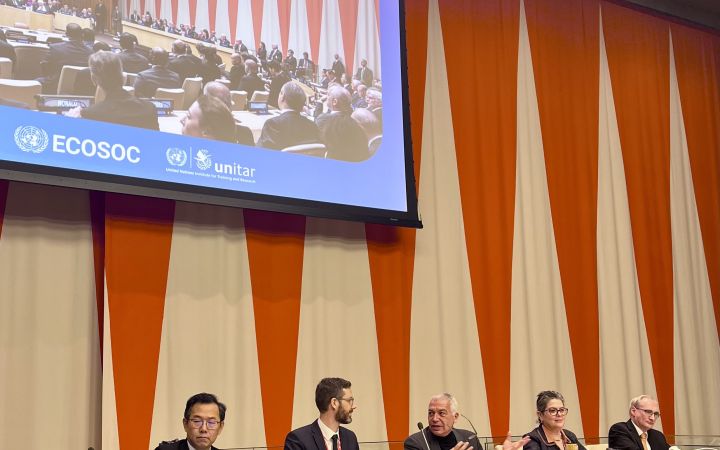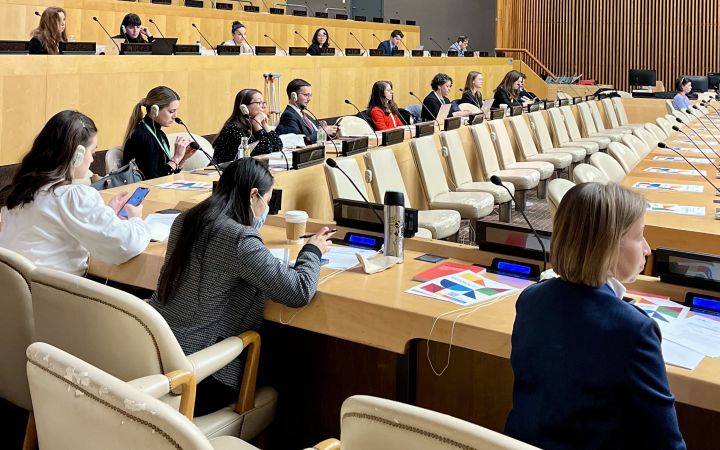15 December 2022, New York City, U.S.A. – The United Nations Institute for Training and Research New York Office lead the annual Orientation Course of the Economic and Social Council for 2022-2023. The day-long training was held in a hybrid format, with majority of attendees joining in person in the ECOSOC Chamber at the United Nations Headquarters and more attendees connecting through Webex.
Consisting of nine courses and lasting from 10:00 AM to 6:00 PM EST, the orientation course addressed several topics such as the working methods and structure of the ECOSOC, the ECOSOC Youth Forum, the functions of the Council’s Segments and Forums and what role the Council plays in addressing peace and development. This day-long event was sponsored by the Permanent Mission of Sweden under the programme “Leveling the Playing Field."
Mr Marco Suazo, the Head-of-Office of UNITAR New York, delivered opening remarks and moderated the orientation throughout the day-long event. Following the opening remarks, Mr Suazo introduced Ms Mario Barthelemy, the Director of the Office of Intergovernmental Support and Coordination for Sustainable Development (OISC.DESA), who conducted the first session, during which she explained the core functions of Economic and Social Council and the High-Level Political Forum (HLPS).
Session two, hosted by Mr Ziad Mahmassani, the Secretary of the Third Committee and Senior Intergovernmental Affairs Officer, covered the working methods and decision-making procedures of the Economic and Social Council. In addition, Mr Mahmassani explained the duties and functions of the ECOSOC President and Bureau. Shortly after the beginning of the second session joined, H.E. Ms Lachezara Stoeva, the Permanent Representative of Bulgaria to the United Nations and President of the ECOSOC. Ms Stoeva was elected 78th President of the Council on 25 July 2022, she reflected on her work and experience so far, in relation to Mr Mahmassani’s session. This discussion sparked open dialogue with the audience and Ms Stoeva received some questions from participants, shown on the right.
Mr Suazo then passed the floor to Ms Leslie Wade, Chief of the Inter-Organizational and Inter-Institutional Support Branch (HSB), of the Office of Intergovernmental Support and Ms Naiara Costa, the Senior Sustainable Development Officer, the Outreach and Partnership Branch, of the Division for Sustainable Development Goals (DSDG/DESA) who lead the third session. This session focused on discussing the objectives and outcomes of the Coordination Segment and the Partnership Forum. The events will occur on 1-2 February 2023 and 31 January 2023, respectively.
Ms Caroline Lombardo, the Chief of the International Tax and Development Cooperation Branch and Ms Mariangela Parra-Lancourt the Chief of the Strategic Engagement and Policy Integration Branch of the Financing for Sustainability Development Office (FSDO/DESA), lead the fourth session, during which they discussed upcoming Development Cooperation Forum and Financing for Development Forum. The events will take place from 14-15 March 2023 and 24-27 April 2023, respectively. In particular, this session focused on how the two institutions can bring value to and effectively support national-level efforts on finance and development cooperation.
After a break for lunch, the orientation resumed with the second part of the course. Moderated by Mr Suazo and Ms Patricia Chaves, the Senior Sustainable Development Officer, Office for Intergovernmental Support and Coordination for Sustainable Development (OISC/DESA). Mr Christian Schlapfer, the First Secretary for Sustainable Development and Humanitarian Affairs at the Federal Department of Foreign Affairs of Switzerland (FDFA) who presented the ECOSOC Handbook that was published by the FDFA. He reflected that the Department hopes this Handbook will aid delegates in making more contributions to the Council.
The fifth session was held by Mr Alexander Roehrl, the Senior Economic Affairs Officer, Integrated Policy Analysis Branch, Division for Sustainable Development Goals (DSDG/DESA). Mr Roehrl discussed the ECOSOC Youth Forum, taking place on 18-20 April 2023, and the Multistakeholder Forum on Science, Technology, and Innovation on 3-4 May 2023. Specifically, this session addressed the importance of youth engagement, science, technology, and innovation contributing to the work of the ECOSOC in advancing the implementation of the 2020 Agenda.
Session six was hosted by Mr Wook-Jin Chang, the Chief of the Non-Governmental Organizations Branch, Office of Intergovernmental Support and Coordination (OISC/DESA). Mr Chang addressed how the ECOSOC can serve as a platform for engaging civil society stakeholders. In addition, he discussed the function of the Committee on Non-Governmental Organizations, his specialization.
Later, session seven addressed the Operational Activities for Development Segment that will be held from 23-25 May 2023. Ms Zina Mounla, the Operational Activities Policy Branch Chief, Office of Intergovernmental Support and Coordination (OISC/DESA). Throughout the session, Ms Mounla covered the key issues, content, scope and applicability of the Quadrennial Comprehensive Policy Review of UN System Operational Activities (QCPR). Specifically, Ms Mounla addressed what ECOSOC’s role has been since the adoption of the QCPR resolution by the General Assembly.
Next, Ms Chavez passed the floor to Ms Anastasia Carayanides, the Chief of the Intergovernmental Policy Section at the Office for the Coordination of Humanitarian Affairs, OCHA, who lead Session eight. Addressing the Humanitarian Segment, taking place on 21-23 June 2023, and the Transition from Relief to Development on 20 June 2023, Ms Carayanides shared statistics that put into perspective how many people are currently affected by starvation. In fact, the combined populations of Bulgaria, Italy and Zimbabwe are equal to the number of people who are at risk of starvation.
The ninth and final session was hosted by Ms Wade, who returned to discuss the Economic and Social Council’s role in coordinating, guiding, and addressing peace and development. After defining the links between peace, security and development, Ms Wade explained how the ECOSOC works with the Peacebuilding Commission and Security Council. Moreover, the focus of Ms Wade’s session was the role of Member States in addressing the needs of conflict-affected countries, in support of tailored international engagement, using the case of Haiti as her main focus.
Closing the orientation course, Ms Chavez delivered closing remarks thanking facilitators and participants for engaging and reminding the audience that they should not hesitate to reach out for further information. Once again, this concluded another successful ECOSOC Orientation Course that allowed a platform for direct engagement between international experts and delegates, who were familiarized with the work of the Economic and Security Council and its interaction with other international institutions.


